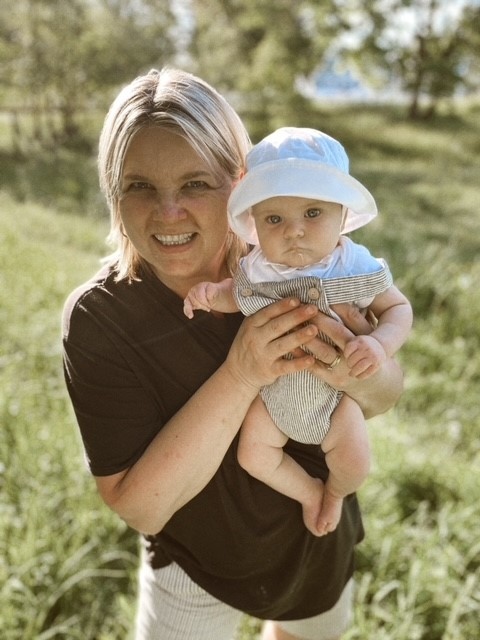'A sucker punch': COVID-19 advisory creating chaos for holiday travellers
Janice Nikkel gets to see her grandson on FaceTime every day.
But what she really wants is to hold him.
“If I could go see him, it would make my Christmas extra special,” the Langley resident said.
When travel restrictions were lifted in the fall, she booked a trip to visit baby Benji and her daughter and son-in-law, who live in Switzerland for part of the year.
Then Ottawa changed the rules on Wednesday, advising against all non-essential international travel because of the Omicron variant of COVID-19.
Nikkel said it felt like a “bit of a sucker punch.”
“I felt gutted in a way,” she explained. “You’re double vaccinated. You get to travel. That’s what we were told.”
Nikkel is one of thousands of Canadians wading through the chaos created by COVID-19 this holiday season, their travel plans in limbo.
Nikkel is trying to figure out if she can get a refund or credit for her flight, but hasn’t been able to reach the travel company.
“I’m having trouble getting a hold of them and getting answers on what I can and cannot do. I don’t know if I have coverage at the moment,” she said.
One of the questions for many travellers is whether their travel insurance will allow them to cancel their trips.
“If you booked your trip during the time that the advisory wasn’t at the current level, chances are you are going to have a good opportunity to claim on that should you need to choose to cancel this trip,” explained Will McAleer, executive director of the Travel Health Insurance Association of Canada (THIA)
Some airlines – like Air Canada – also offer options including making a change to another date without a change fee, even on non-refundable tickets.
WestJet allows passengers who book before January 31, 2022 to change or cancel the flight once without penalty, but the change must be made more than 24 hours before departure.
Another concern is whether the travel advisory change will affect medical trip insurance.
“(Travellers) don’t necessarily need to be really concerned about whether or not – if they get sick while they’re away – that they’re going to have a problem because the travel medical insurance policies are, by and large, going to continue to be able to cover you, even though the threat level has been raised by the government,” said McAleer.
Travel agents say some people are cancelling their trips, but others are sticking with their plans.
“People are calling asking where they get can PCR tests, so obviously people are still planning on travelling,” said Cathy Larsen of Departures Travel in Sidney.
As for Nikkel, her heart is in Switzerland with her grandson.
“It’s really heartbreaking because I love my grandbaby,” she said.
But the new rules have left her trip to see him up in the air.
 Janice Nikkel gets to see her grandson on FaceTime every day, but what she really wants is to hold him this holiday season. (Janice Nikkel)
Janice Nikkel gets to see her grandson on FaceTime every day, but what she really wants is to hold him this holiday season. (Janice Nikkel)
CTVNews.ca Top Stories

B.C. tenants evicted for landlord's use after refusing large rent increase to take over neighbouring suite
Ashley Dickey and her mother rented part of the same Coquitlam duplex in three different decades under three different landlords.
Mountain guide dies after falling into a crevasse in Banff National Park
A man who fell into a crevasse while leading a backcountry ski group deep in the Canadian Rockies has died.
Expert warns of food consumption habits amid rising prices
A new survey by Dalhousie University's Agri-Food Analytics Lab asked Canadians about their food consumption habits amid rising prices.
MPP Sarah Jama asked to leave Ontario legislature for wearing keffiyeh
MPP Sarah Jama was asked to leave the Legislative Assembly of Ontario by House Speaker Ted Arnott on Thursday for wearing a keffiyeh, a garment which has been banned at Queen’s Park.
Charlie Woods, son of Tiger, shoots 81 in U.S. Open qualifier
Charlie Woods failed to advance in a U.S. Open local qualifying event Thursday, shooting a 9-over 81 at Legacy Golf & Tennis Club.
Ex-tabloid publisher testifies he scooped up possibly damaging tales to shield his old friend Trump
As Donald Trump was running for president in 2016, his old friend at the National Enquirer was scooping up potentially damaging stories about the candidate and paying out tens of thousands of dollars to keep them from the public eye.
Here's why provinces aren't following Saskatchewan's lead on the carbon tax home heating fight
After Prime Minister Justin Trudeau said the federal government would still send Canada Carbon Rebate cheques to Saskatchewan residents, despite Saskatchewan Premier Scott Moe's decision to stop collecting the carbon tax on natural gas or home heating, questions were raised about whether other provinces would follow suit. CTV News reached out across the country and here's what we found out.
Montreal actress calls Weinstein ruling 'discouraging' but not surprising
A Montreal actress, who has previously detailed incidents she had with disgraced Hollywood producer Harvey Weinstein, says a New York Court of Appeals decision overturning his 2020 rape conviction is 'discouraging' but not surprising.
Caleb Williams, Jayden Daniels and Drake Maye make it four NFL drafts with quarterbacks going 1-3
Caleb Williams is heading to the Windy City, aiming to become the franchise quarterback Chicago has sought for decades.

































